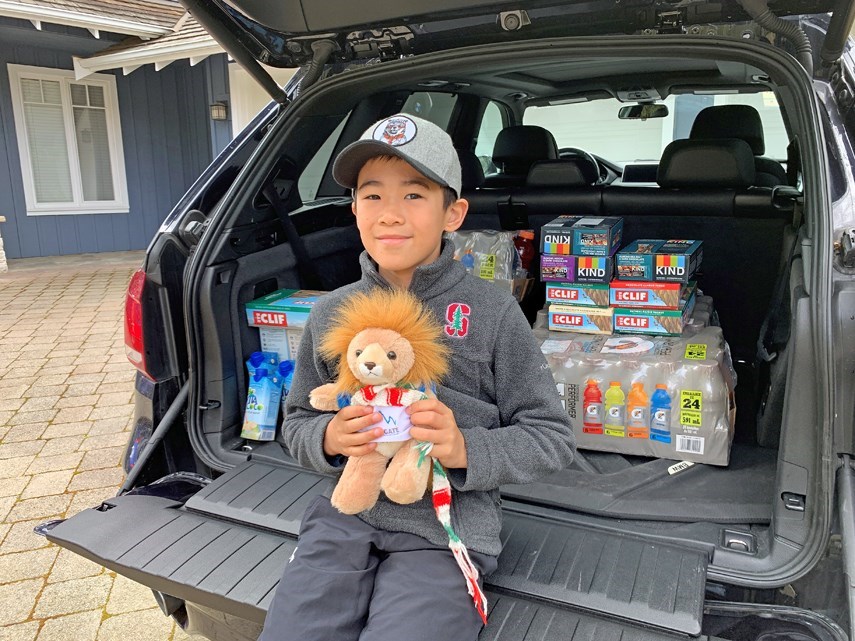Three North Shore residents were given the provincial Medal of Good Citizenship this month for their outstanding work in their respective communities during the last tumultuous year.
The Medal of Good Citizenship is an award given to those who aid and help their communities by going above and beyond the average citizen. With the North Shore being strongly represented, these three residents are all very deserving of such recognition.
West Vancouver youth generates massive donations
Jonathan “Bear” Yeung, aged 11, from West Vancouver has been organizing community support efforts for years, and when the COVID-19 pandemic hit he increased his efforts when he noticed so many more in need.
Yeung first began his pandemic-related charitable efforts by organizing a snack drive for front-line health care workers, according to a release from the province. Initially spending his own life savings of $70 on snacks and electrolyte drinks, his efforts grew as the pandemic continued, becoming a year-long program that supplied food and support by engaging the community and larger companies to supply those who were at the forefront of the pandemic.
Yeung also took notice of the need at B.C. Children's Hospital, where many children felt the effects of isolation more than ever due to COVID-19, as with restrictions they had limited contact with friends and family. He began a movement to supply the children at B.C. Children's Hospital with tablets to help them connect to the outside world, as well as toys to help entertain them during this difficult time. He delivered more than 1,000 toys and 159 tablets as well as $14,000 in donations by Christmas, and the next year he doubled that and then some, delivering more than $60,000 in donations for B.C. Children's.
His other work includes helping a family that got into a severe car accident on the Sea to Sky Highway by collecting $20,000 in donations, helping supply the West Vancouver Police Department with masks during the pandemic, and organizing clean-up efforts for community park benches.
Going above and beyond for Capilano University students
Natalia Skapski has a long history of helping those in need. A 15-year volunteer at the Red Cross, Skapski was deployed in aid of the Mississippi floods in 1993 and was a volunteer during 9/11.
During the last year, however, Skapski, the associate director of safety and emergency at Capilano University, dedicated her time to ensuring the safety and well-being of the students at Cap U during COVID. Skapski made sure that the campus was up-to-date with all their safety procedures, and answered questions big or small from students and staff.
Offering her time and mentorship to the small and fledgling emergency response department, she was crucial to the success of the Cap U team. Skapski built strong connections to the campus community and continues to provide support in the twilight of the pandemic. She offers an empathetic ear to someone who may be nervous of COVID when classes were being held in person again, as well as provided any who asked for factual and accurate information.
Additionally, she is a founding member of the Sema7maka (Snowbird) Squamish Nation canoe family, and a member of the Pulling Together Canoe Family, as she engages in work of reconciliation.
Skapski also aided in mucking out homes in the Sumas Prairie area of Abbotsford during the flooding of November, 2021, and also began volunteering for Team Rubicon, an NGO focused on international disasters globally.
Distillery owner makes medical grade sanitizer
James Lester is the owner and operator of the Sons of Vancouver distillery in North Vancouver, a small operation that specializes in small-batch artisan spirits.
During the pandemic, Lester was becoming increasingly aware of the need for medical-grade sanitizers as COVID grew in scope. As much as his spirits could help people during a great time of stress and anxiety, he realized that his company could help in a much more practical way.
With the ability to make medical-grade alcohol for sanitization, he was contacted by organizations that were feeling pressure due to what had become a shortage. Women’s shelters, a needle exchange, care homes had all reached out, the dilemma being it was not strictly legal. In response to this, he became an advocate and helped petition the government in changing the restrictions on who was allowed to produce sanitizer.
With the ability to create such a necessity during the pandemic, he began in earnest to put a dent in the demand, giving it away to those in need, even partnering with local grocery stores to sell hand sanitizer with the proceeds going to Lions Gate Hospital.



